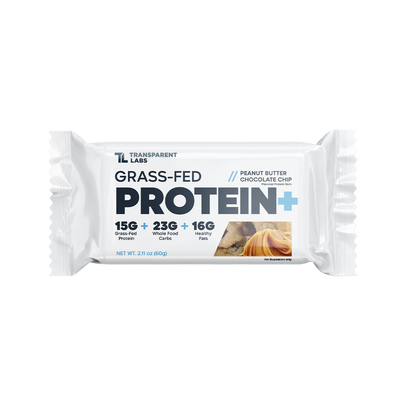Where Most Joint Supplements Go Wrong (and What To Take Instead)

Joint health is one of the most overlooked areas of wellness. In fact, many athletes don't give their joints a second thought until they cause physical pain.
Think about it: No matter how much you love working out, you can’t hit the squat rack if your body is partly broken down. To keep yourself injury-free, you should rest, practice active recovery techniques, and take care of your muscles, bones, and joints.
Speaking of joints, it’s imperative to work on mobility, watch your weight, and take joint supplements when necessary. In this article, we will discuss why joint health is so important and what to look for (and avoid) in joint supplements.
Please note: The following post is meant for informational purposes only and should not be taken as medical advice. If you suffer from joint pain or arthritis, consult your family doctor.
Why Joint Health Is Important
A joint is where two bones join together. Most joints contain cartilage so the bones can glide smoothly against each other.
You need healthy joints to run, land a box jump, lift, and do other forms of physical activity. However, your joints can deteriorate over time, which can be extremely painful and negatively impact your workouts.
Arthritis refers to disorders that erode the joints over time as a result of chronic inflammation. There are many types of arthritis, and arthritis can worsen as you age. By keeping your joints healthy, you'll more likely be able to continue your workout routine as you grow older.
How To Keep Your Joints Healthy

So, what can you do to keep your joints healthy? Here are four tips to keep in mind:
1. Substitute High-Impact Exercise for Low-Impact Exercises
Some people believe that exercise causes joint deterioration — particularly arthritis of the knee. However, studies show no causation between exercise and arthritis. (In fact, exercise can provide joint pain relief, as it encourages weight loss. We’ll discuss this in the next section.)
If jogging on concrete streets is your chosen form of exercise, replace this with something that's easier on your joints, like lifting weights or HIIT workouts (but try to only jump on padded surfaces like turf).
2. Watch Your Weight
When you walk, the force on your knee joints is 1.5 times your bodyweight.
In other words, if you are a 200-pound man, you put 300 pounds of force on your knees. Because of this, a 250-pound man is more prone to knee pain than a 200-pound man, even if the two men have the same BMI.
3. Do Mobility Exercises
Mobility exercises are a great addition to any active recovery routine — even if you don't currently suffer from joint pain.
While flexibility helps elongate (i.e., stretch) your muscles, mobility helps increase the range of motion in your joints. Doing regular mobility work can help improve joint function and improve your range of motion in strength workouts (like parallel squats).
4. Take Joint Health Supplements
When diet and exercise are not enough to control joint pain, you may want to consider taking a dietary supplement. While many joining supplements are helpful, many joint supplements in the United States contain ingredients that are not scientifically proven to improve joint health (as you'll see below).
Where Many Joint Supplements Go Wrong
Two of the most common ingredients in joint supplements — chondroitin and glucosamine — haven't been proven effective at improving joint health.
Both chondroitin and glucosamine are found naturally in the human body. You'll find them in connective tissue (glucosamine is the building block of cartilage) or in supplement form.
Sulfate supplements made with chondroitin sulfate, glucosamine sulfate, and hyaluronic acid are the most commonly-prescribed medications to treat osteoarthritis. Osteoarthritis is a degenerative joint disease causing cartilage loss over time. Although it can negatively impact any joint, it can especially cause issues in your hands, knees, hips, and back.
Unfortunately, science shows chondroitin and glucosamine are ineffective at improving joint health. Some studies show a glucosamine-chondroitin combination supplement can help improve arthritis pain. However, other studies show that on its own, chondroitin has proven to be ineffective at treating arthritis pain but could benefit joint structure.
In fact, the American College of Rheumatology (ACR) recommends people don't take either glucosamine or chondroitin supplements for osteoarthritis.
The Best Joint Supplements for Joint Health
Joint supplements can help improve joint function and provide anti-inflammatory effects to help reduce joint pain. However, it's important to know which ingredients have been scientifically proven to improve joint health.
If you've been taking triple strength ibuprofen for months with no relief in sight, try a joint supplement with the following ingredients:
1. Turmeric
Turmeric has long been praised in health circles for its pain-relieving and anti-inflammatory properties.
Turmeric contains curcumin, which is connected to multiple health benefits with few side effects. In a review of multiple studies, curcumin was shown to have antioxidant and anti-inflammatory effects that can help treat arthritis. It also appears to help manage exercise-related inflammation and muscle soreness.
Get More Turmeric in Your Diet
Research suggests that the health benefits of curcumin are most effective when combined with piperine, a constituent of black pepper (Piper nigrum) fruit.
This is why Transparent Labs RawSeries Turmeric 95% Curcuminoids features standardized turmeric extract with BioPerine®, a patented black pepper extract made providing highly concentrated piperine. Both turmeric (as Curcumin C3® Complex) and BioPerine® can also be found in Transparent Labs Joint Support.
2. Boswellia
Boswellia, also known as Indian frankincense, is an herbal extract from the Boswellia serrata tree.
A research overview published in the Indian Journal of Pharmaceutical Science contends that the alpha-keto acids found in Boswellia extract can effectively treat rheumatoid arthritis, an autoimmune joint disease. Boswellia extract has also been shown to significantly reduce joint pain, which contributes to better joint function.
Where to Find Boswellia
Since Boswellia is rarely consumed as part of the diet, a supplement is necessary to get the benefits of this promising herb.
By combining Curcumin C3® Complex, FruiteX-B® calcium fructoborate, Boswellin® Super, UC-II® collagen, and Bioperine® (piperine), Transparent Labs WellnessSeries Joint Support can help with joint pain relief.
3. Omega-3 Fatty Acids
Due to their anti-inflammatory effects, some scientists encourage omega-3 fatty acid supplements to treat rheumatoid arthritis and joint pain.
In one study, rheumatoid arthritis patients noted that an omega-3 fatty acid supplement helped improve morning stiffness and joint pain. However, similar studies have been inconclusive.
How to Get More Omega-3 Fatty Acids in Your Diet
Many athletes take fish oil supplements to get more omega-3 fatty acids in their diet. However, the purity and EPA/DHA content in fish oil varies significantly.
Instead, we recommend taking the CoreSeries Krill Oil, made from Antarctic krill species that are rich in omega-3 phospholipids. This makes the EPA and DHA in krill oil more bioavailable and gentler on the stomach than traditional fish oil supplements.
4. Vitamin D
Vitamin D is often correlated with strong bones, cartilage, and muscle function, but it can also help mitigate inflammation in osteoarthritis and rheumatoid arthritis.
While the evidence is still growing, scientists believe there may be a connection between vitamin D deficiency and joint pain. In a five-year study, researchers found that people with vitamin D deficiency were more likely to develop hip and knee osteoarthritis.
Get More Vitamin D in Your Diet
To get more vitamin D in your diet, try the RawSeries Vitamin D3, which may help improve muscle recovery, reduce bone fracture risk, and increase your strength and performance.
Joint Supplements Can Reduce Pain, Inflammation, and Risk of Injury
If you mitigate your risk of injury, you decrease your chances of getting sidelined from your workouts.
You need healthy joints to lift, do HIIT workouts, and log miles on the pavement. Unfortunately, our joints become increasingly prone to pain and inflammation as we age.
Most popular joint supplements on the market contain chondroitin and glucosamine, which are ironically not that effective at treating joint pain according to a recent meta-analysis.
On the contrary, nutrients and herbal extracts like turmeric, omega-3 fatty acids, vitamin D, type-II collagen, and Boswellia can actually help reduce inflammation and improve joint function.
For best results, we recommend taking Transparent Labs Joint Support, which contains ingredients backed by numerous clinical studies and shown to improve joint health.










